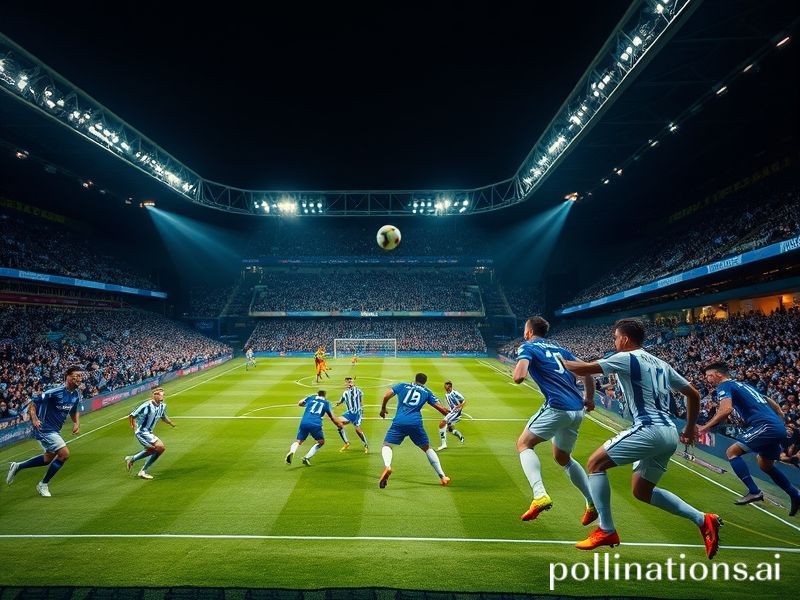Chelsea vs Brighton: How a Provincial English Fixture Became the World’s Most Passive Geopolitical Summit
Chelsea vs. Brighton: A Quiet Derby for the Age of Quiet Catastrophe
By Dave’s Locker International Desk (and the ghost of a failed futures trader still haunting Stamford Bridge)
London – In any other decade, a Chelsea versus Brighton fixture would be filed under “quaint regional curiosity” and left for the parish newsletter. Yet here we are, mid-2024, with the planet simultaneously on fire and on sale, and suddenly this particular southwest-to-southeast train ride has become a geopolitical Rorschach test. Two clubs, two coasts, one lingering question: if football is the opium of the people, why does the high feel so much like a sugar crash?
Let us zoom out. In the grand bazaar of global capital, Chelsea are the art-world equivalent of a Jeff Koons balloon dog—gargantuan, shiny, and purchased by a consortium whose tax residency is best described as “miscellaneous.” Their American backers, fronted by a private-equity chap who pronounces “Brighton” as if it were a rare Bordeaux, insist the club is merely a “multi-vertical entertainment asset.” Translation: if the goals dry up, we’ll pivot to NFT stadium urinals. Brighton, meanwhile, are that irritating indie band your algorithm keeps sneaking onto every playlist: small, relentlessly competent, and owned by a Brighton-born tech tycoon who still remembers when the Amex Stadium was a rubbish tip. One club is a leveraged bet on the future of soft power; the other is a community trust fund with a surprisingly good left-back.
The international implications? Oh, they’re there, lurking under the match-day ponchos. Broadcast rights for this single game will beam into 189 countries, from Ulaanbaatar sports bars where yak-milk lattes cost extra, to Singaporean hedge-fund canteens where the screen is bigger than the pitch. Each camera pan across the away end is, unwittingly, propaganda: look how orderly the English remain while their rivers turn to soup. Meanwhile the global futures market treats the final score like a minor OPEC meeting—every misplaced Gallagher pass nudges leveraged betting syndicates in Macau, whose algorithms have already priced in the referee’s blood pressure.
Humanitarian crisis? Sort of. Chelsea’s squad cost roughly the GDP of the Central African Republic, a fact that would be in poor taste to mention except the club’s own media team keeps accidentally tweeting it. Brighton’s starting XI, assembled for less than the price of a London parking space, are held up by the commentariat as proof that virtue can still triumph—conveniently ignoring the part where the club’s analytics department is quietly hoovering up teenage prospects from Dakar to Dundee like a morally conflicted Roomba.
On the touchline we have two managers who represent the yin and yang of late-capitalist anxiety. Chelsea’s head coach (interim, pending the next boardroom bloodletting) speaks fluent buzzword and subsists entirely on green juices and dread. Brighton’s gaffer, an erstwhile university lecturer, delivers post-match sound bites so thoughtful they require footnotes. One man is trying to save his job minute by minute; the other is trying to save the concept of sustainable recruitment. Both will be fired within eighteen months—this is the Premier League, not a TED Talk.
And the fans? Ah, the fans. In the Matthew Harding Stand, season-ticket holders grumble about geopolitics between bites of eight-quid falafel. In the away end, Brighton supporters chant about sea shanties and the price of train tickets, blissfully unaware that their carbon footprint has been offset by a shell company registered in the Caymans. Everyone agrees the VAR decision was an affront to natural justice, which at least provides a fleeting sense of unity before we all return to our algorithmic silos.
The final whistle will blow, the floodlights dim, and the planet will keep spinning toward its next scheduled disaster. Yet somewhere in Lagos a kid will replay the winning goal on a cracked phone screen; in Toronto a commodities trader will hedge wheat futures against the over/under on corner kicks. That, dear reader, is the modern miracle: a provincial English football match now doubles as the world’s most passive international summit—no communiqué, no photo-op, just ninety minutes of choreographed chaos and the comforting illusion that somebody, somewhere, still knows what they’re doing.
Conclusion: Chelsea vs. Brighton will not solve climate change, reform FIFA, or lower your rent. But for one evening it will allow eight billion people to pretend that offside lines and xG graphs are the most pressing moral dilemmas we face. If that isn’t worth a £14 stadium pint, what is?







